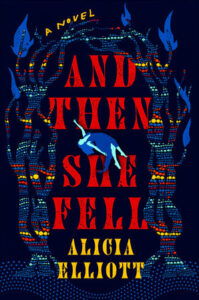
What's Unreal is Real: Alicia Elliott on the Tired Trope of Madness in Fiction
"There is a cheapness to this sort of revelation."
Tell me if you’ve heard this twist ending before.
Something troubling is happening to the protagonist, causing them to question everyone around them. Maybe she seems to uncover a nefarious plot against her. Or maybe he meets a wild new person who makes him feel alive. Maybe they’re following a spiraling trail of clues to figure out who murdered their family member. The details aren’t that important. What’s important is the suspense—and, at the end, the reveal.
That reveal: whichever story was being told, whatever the details and emotions they conjured, that entire story was…wait for it…all in the protagonist’s head!
There is a cheapness to this sort of revelation, and yet the “shocking twist” that the character readers dared to believe in was actually just crazy is one that perseveres. It has been used so often that it’s now practically entombed inside the classics of all genres that run on suspense: mystery, thriller, horror. If one ever wants to really shock an audience, these works seem to say, all one needs to do is inject some good ole’ mental illness. For what’s scarier than someone you trusted not only turning out to be completely untrustworthy, but also mentally ill?
I’ve always understood this fear. My mother struggled with bipolar disorder my whole life. Her mania often including elements of psychosis, including hallucinations and delusions. When I was a child, sometimes she would tell me the world was ending very soon, that we should look for three days of complete darkness to descend, during which demons would knock on our doors and speak in the voices of our loved ones, trying to trick us. Other times, she would tell me that her computer business was days away from taking off, that we were going to become millionaires, that I should think about what I wanted her to buy me first. Whether her story was terrifying or hopeful, there was this fiery certainty in her eyes when she spoke that ensured that, no matter how fantastical her words were, I always wholeheartedly believed them.
What’s scarier than someone you trusted not only turning out to be completely untrustworthy, but also mentally ill?
But as I became a teenager, I began to notice none of her predictions ever came true. Years would pass and nothing would change—apart from her presence in our lives, which fluctuated according to her forced hospitalizations. She’d come home weeks or months later, a version of herself with the volume turned down low. Then, eventually, the stories—and that fiery look—would start again, and I’d watch, angry, helpless, as my younger siblings swallowed down the same stories I had.
“You shouldn’t believe her,” I’d tell them later, thinking I was doing them some sort of favor, even as I was sometimes crushing their most ardent hopes. “She’s manic.” My father had taught me the term, as well as how to employ it: not as a medical diagnosis, but an act of dismissal.
Sometimes, though, she’d tell new stories; scary ones about my father, or her mother, or other brutalities that had been enacted on her in her past. They were the sorts of stories she’d never even hint at when she wasn’t sick, and there was a desperation and pain peaking out of the bravado that made them different. But since I’d already decided my mother wasn’t to be believed, I didn’t know how to situate these stories in the context of my life, or any context, so I decided I simply wouldn’t.
It didn’t occur to me at the time, but I was essentially doing the same thing as these thrillers: positioning my mother’s mental illness as a sort of jump scare revelation. It wasn’t just meant to surprise—it was also meant to undermine my mother’s credibility, to completely separate her from the realm of reliable, sane folks. It was to make her out to be “crazy”—and thus, a liar. Nothing she said while “crazy” could be trusted. Nothing she said while “crazy” was real.
Perhaps unsurprisingly, I grew up to have the same complaint of these “it was all in their head!” twist-endings. If the character was really “crazy” the whole time, then nothing I saw or emotionally invested in really happened, which meant none of it really mattered, which meant I’d ultimately wasted my time.
And then I descended into madness in the summer of 2020. The moment my mania and psychosis made themselves apparent, as far as everyone around me was concerned, I had become that exact crazy, lying, unreliable narrator I’d been so offput by in the past. I was living my absolute worst fear—but I was also undergoing a sort of reckoning for the ways I’d thought of, treated, and spoken about my mother.
It seems ridiculous in retrospect, but the whole time I lived with her, I’d never once considered how dehumanizing her experience was. I didn’t think about how it must have hurt to be considered inherently untrustworthy by every person in your life—until it was happening to me. Suddenly, it didn’t matter what I said—everything was considered a lie, simply because I was manic. When everyone thinks you’re lying about everything, and they start to treat you differently as a result, keeping things from you as they discuss what’s “to be done” with you, and you have no control over any of it, it’s hard not to become paranoid.
So the cycle repeats and reinforces itself: you experience delusions and paranoia, people recognize you’re “crazy,” then treat you like you’re “crazy,” thus further feeding any delusions or paranoia about those people and their intentions that you already had. Round and round it goes, and all the while, you as the “crazy” person are told that you deserve the way you’re being treated; that all your feelings of paranoia are illogical despite some of them being actually warranted; that your real-life stresses that escalated you to the point of madness aren’t important; and that all you need is medication that will be forcefully injected into you, if necessary.
Then, as if all of that wasn’t enough, once you’re fully out of the thrall of madness, you are left confused about that time, not knowing what was “real” and what wasn’t. Worse, you’re told to completely disregard everything you thought, felt, and experienced while “crazy.” After all, it didn’t happen and, therefore, it didn’t matter. Even though it was one of the most simultaneously traumatizing and illuminating experiences of your life, it was, ultimately, a waste of time.
I wonder why sane audiences should have the easy comfort of differentiating between the “real” and the unreal in our stories.
I’ve always thought that stories can reflect the world. Unfortunately, the “it’s all in their head!” twist ending does reflect the world, in part. It reflects and reinforces the societal idea that people experiencing mental illness are liars who can’t be trusted, that their stories’ and experiences’ only value comes from their ability to shock the sane. It indulges the voyeuristic, ignorant gaze of those society considers “sane,” picking at the unspoken fear all sane people have of becoming mad themselves, while conveniently never forcing them to reckon with why, exactly, they should be afraid of such a thing.
As someone who has lived a relatively mild version of that horror story, but still faced devastating consequences and traumas that came after the surprising, so-called “twist” that is madness, I wonder why sane audiences should have the easy comfort of differentiating between the “real” and the unreal in our stories when we will never have that comfort ourselves.
Thankfully, there are mad writers who are pushing against that expectation, using character, form, structure and plot to better reflect our actual experiences and realities. This is something that I tried to do in writing my own novel, And Then She Fell. My main character, Alice, is very much not just her mental illness. She is darkly funny, smart, caring, even (dare I say) likable. By the time her symptoms really started to escalate, I wanted readers to understand and root for her as a person so their own biases against mad people like her fell away. I wanted them to go past the shock of her illness, to see how her “real” life and her psychosis were entangled, each responding to and informing the other.
In keeping with that, it was important to me to emphasize: regardless of whether what Alice saw and experienced in the thrall of her psychosis was “real” or not, it still held meaning for her, helping to metaphorically illuminate the things her conscious, “sane” self did not or would not face.
While it will take more than just stories to reverse the deep-rooted saneism we see in societies all over the world, I’m hopeful that these stories—stories we haven’t actually heard before, or at least, not in this way—will plant seeds for that change.
And if I’ve learned anything from my mother, it’s how much we all need to cling to hope, as unlikely as it may seem.
________________________

And Then She Fell by Alicia Elliott is available from Dutton, an imprint of Penguin Publishing Group, a division of Penguin Random House, LLC.
Alicia Elliott
Alicia Elliott is a Mohawk writer and editor living in Brantford, Ontario. She has written for The Globe and Mail, CBC, Hazlitt and many others. She’s had numerous essays nominated for National Magazine Awards, winning Gold in 2017 and an honorable mention in 2020. Her short fiction was selected for Best American Short Stories 2018 (by Roxane Gay), Best Canadian Stories 2018 and Journey Prize Stories 30. Alicia was chosen by Tanya Talaga as the 2018 recipient of the RBC Taylor Emerging Writer Award. Her first book, A Mind Spread Out On The Ground, was a national bestseller in Canada. It was also nominated for the Hilary Weston Writers’ Trust Prize for Nonfiction and won the Forest of Reading Evergreen Award.



















